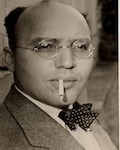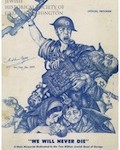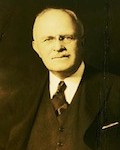Historian and Zionist activist Benzion Netanyahu (1910-2012), who came to British Mandatory Palestine as a child after World War I, became active in Vladimir Ze’ev Jabotinsky’s Revisionist Zionist movement almost from its inception. By the early 1930s, he was serving on its executive committee and editing the party’s daily newspaper, HaYarden. After the outbreak of World War II, Jabotinsky became convinced that the United States would play a decisive role in determining the future of Palestine, and he dispatched a delegation of young Revisionist leaders, including Netanyahu, to the U.S. to undertake Zionist political activity.
During their first year in the U.S., Netanyahu and his comrades initiated a campaign of public rallies for the creation of a Jewish army that would fight alongside the Allies against the Nazis. The campaign attracted the support of numerous intellectuals and political figures. These efforts also helped revive the previously-dormant American wing of the Revisionist movement.
After Jabotinsky’s death, a split emerged among his followers in the United States. A faction led by Hillel Kook left the Revisionist movement and established an independent political action committee focusing on the Jewish army issue. Netanyahu initially worked with the Kook group, but left in 1941 in a dispute over tactics. Kook believed public criticism of the British would backfire, while Netanyahu thought that openly challenging London was the most effective way to influence British policy.
In early 1942, Netanyahu became executive director of the U.S. Revisionist Zionists. Under his leadership, the Revisionists undertook high-profile public information campaigns aimed at pressuring the British to open Palestine to Jewish immigration. “Words are the most effective means of political warfare,” Netanyahu once wrote, and he put that approach into action by publishing a militant Zionist magazine, Zionews, and authoring large newspaper advertisements sharply critical of British policy toward Palestine.
Netanyahu also became one of the first Zionist lobbyists in Washington, traveling frequently to the nation’s capital to speak with government officials and members of Congress about Jewish immigration to Palestine and the cause of statehood. While most mainstream Zionist leaders were Roosevelt enthusiasts and did not build ties beyond the Democratic Party, Netanyahu developed relationships with prominent Republicans that helped bring about the inclusion of a strongly pro-Zionist plank of the GOP’s 1944 platform, which the Democrats then felt compelled to match. This helped enshrine support for Zionism as a principle of both major political parties, and facilitated the ability of future Jewish lobbyists to influence American foreign policy.
Sources: Medoff, Militant Zionism in America, pp. 78-83, 107-110;
Baumel, The Bergson Boys, pp. 69, 96-97.











